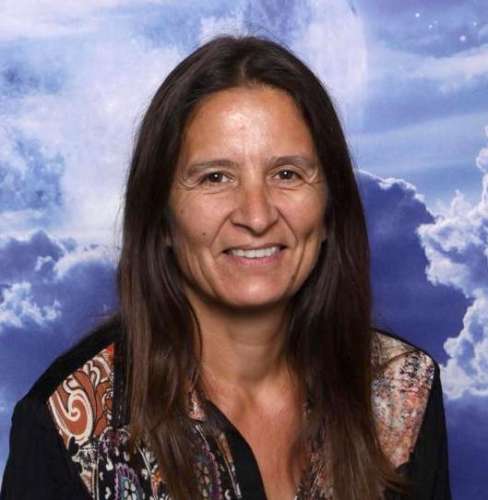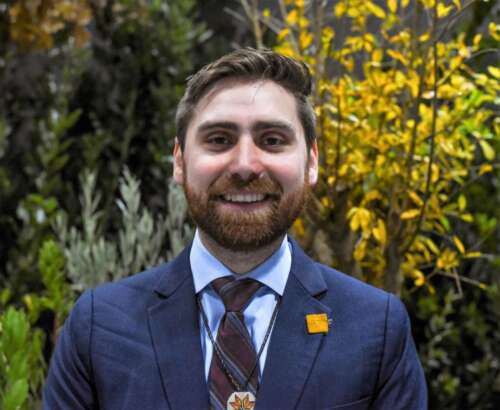The 2022 United Nations Climate Change Conference, or COP27, brought the world together in November. For two Anishinaabe researchers from the University of Guelph, it was an opportunity to connect with other Indigenous Peoples from around the globe to discuss the pressing emergencies of the climate crisis.

Dr. Susan Chiblow, assistant professor in the School of Environmental Sciences at the Ontario Agricultural College, who is Anishinaabe from Grand River First Nation, was told by her grandmother from a young age that her gift for learning would lead to pursuing a Western education in order to better help her people.
Years later, as the world faces a climate crisis, Chiblow, who teaches in the Bachelor of Indigenous Environmental Science and Practice program, found herself invited to COP27 by Dr. Myrle Ballard, the first Indigenous woman to serve as Director of Indigenous Science at Environment and Climate Change Canada.
As part of a panel on Indigenous science at the conference, Chiblow said she spoke in relation to water. “We are all water,” she said, noting the responsibility to protect the lands and waters belongs to everyone, not just Indigenous Peoples.
“Sharing my experiences of where I’ve been and how I’ve gotten here is helpful for Indigenous Peoples to see I can work in an institution but remain connected to the Elders and the lands,” Chiblow said.
That perspective impacted Clifford Mushquash, an Anishnaabe delegate in attendance at the panel, who wrote that hearing Chiblow speak helped him find his own voice.
Hope lies in the next generation of climate leaders
To share on a global stage like COP27 reaffirmed what Chiblow has long known – the climate crisis demands action. Attending negotiations, her experience was that Indigenous Peoples were at the table but not considered equal partners. “At those larger tables, I really don’t see any movement.”
Chiblow sees hope in younger generations who she feels have a fulsome understanding of the climate crisis and are starting to use their voice to act on it. She credits the work of organizations like Indigenous Climate Action – an Indigenous-led, Amiskwaciwâskahikan-based, non-governmental, non-profit – to push the conversation forward in settings like COP27 as well as create tools for communities on the ground.
“There is hope for the future if people do something about it and not rely on governments,” she said. “We have the skillset and the tools to do it ourselves. There lies the hope.”
Back home at U of G, Chiblow said her students taking Indigenous 1000 Indigenous-Settler Relations are pushing for such courses to be mandatory for all students, regardless of their field of study. It is that bridge connecting two cultures facing the same threat that Chiblow felt was missing at COP27.
The Indigenous caucus she was part of provided opportunities to connect with other Indigenous Peoples from across the world. However, the goal, she said, is to figure out how to connect and reach broader audiences in settings like COP27.
Indigenous representation grows at COP27
The growing representation of Indigenous Peoples at the Conference of the Parties is important, said Dr. Graeme Reed, a recent U of G doctoral graduate studying the intersection of Indigenous governance, environmental governance and the climate crisis.

Reed, who is Anishinaabe, Scottish, English and German, from the Wiikwemkoong Unceded Territory, attended his fifth COP in his role as senior policy advisor with the Assembly of First Nations.
Reed, a member of the Facilitative Working Group of the Local Communities and Indigenous Peoples Platform, facilitated several meetings prior to the conference, hosted and chaired the Indigenous Peoples Caucus, and co-moderated the Knowledge Holders Gathering and an Indigenous youth gathering. He also co-chaired a meeting with Egyptian COP president and the UN secretary general, participated in and coordinated panels, and helped present the opening ceremony at the Indigenous Peoples’ Pavilion.
“Climate change is a cumulative effect of systems of colonization and capitalism that create extractive processes,” Reed said. The systems change required is often perceived as technical, which conflicts with the way Indigenous Peoples view the climate crisis as an imbalance between humans and the world around them.
“We’re often talking about different problems,” he said, “and as a result, we’re talking about different solutions.” The magnitude of the problem and the required change necessitates conversations deeper than considering greenhouse gas reductions, he added.
The Assembly of First Nations set expectations in a position paper prior to COP27. Reed said that enabled it to see success in identifying perspectives and outcomes exhibited in the various events held.
Still, he felt there was a disconnect between presence and participation in decision making. The climate crisis is not solved at the COP level, he said. “It is an important moment in time, but it’s not the place where we’re solving these issues.”
Contact:
Dr. Susan Chiblow
schiblow@uoguelph.ca
Dr. Graeme Reed
greed01@uoguelph.ca
